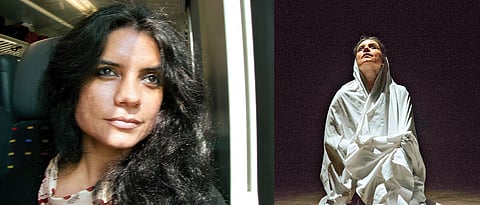

In a world that likes to preserve its dichotomy, where science and the arts are two twain that don’t necessarily meet, Jyoti Dogra has devised, acted in and directed a play called Black Hole. Yes, it draws from astrophysics, cosmos and how we experience it.
To be staged in the city on Thursday during the ongoing Saarang Theatre Festival, Dogra’s Black Hole has a woman, a single white sheet and the cosmos. The actor-director mostly works on her own and she has increasingly moved towards making devised pieces that are not narrative or text driven, but use the self as a starting point.
What does self mean?
“When I say that all my works start from self, it means I begin with what I am experiencing. I don’t begin with Ki chalo abhi auratoein pe kam karna chahiye ya bachcho pe kaam karna chahiye. I don’t start with a topic, I start with an experience,” she says.
Dogra has been interested in astrophysics since she was a child, and liked this idea of a big universe and earth rotating around the sun. “I am interested in astrophysics. I feel we know the stars, sun, earth, we have information about them, but experiencing them is very difficult. But we do experience them, if only momentarily. And, then we are back in our real life, waking up, walking to the kitchen, making a cup of chai and so on,” says Dogra, adding, “That connection which we feel ephemerally, is what the play is about, that is where my exploration began.”
The deep connection
A shift occurs when you read a book on science, if you are reading a book on black hole, or big bang theory and then start making connections. You feel the connections even if you gaze at the ocean or at the stars or wonder upon the vastness from where we have come. “Often you feel this experience in the middle of nature, where you feel one with something which is much bigger. This experience can even happen when in love. In love, you feel everything is connected, the world is beautiful. There is a greater, larger presence of your own self. So, I started looking at this experience coupled with science which says that oxygen, nitrogen and hydrogen in your body is the exact same oxygen, nitrogen and hydrogen which makes up a star. It says that the rules governing the solar system are the exact rules which govern your bodily functions,” she says.
Dogra, who has worked Notes on Chai previously, points out, “The piece started with this self-enquiry — ‘what are those moments when I feel a connection with the sky? Or with the stars, with the mountain’. We know that the earth goes around the sun. We experience it day and night, but we don’t necessarily connect that the earth is turning, turning the way your car is turning (on a road). All the experiences and the information tells us that we are a part of the cosmos.”
The story
The focus of the play is a scientific black hole, but there are many stories, that are interwoven in it. Primarily, it is the story of a woman and her mother, who is terminally ill. But the audience might interpret it differently, from the plight of women who cannot see the light at other end, to that bottomless pit which is life.
“It is up to the audience to interpret it the way they wish to, depending on their experiences. My way of looking at Black Hole is what you can see in the play. The woman doesn’t have a name per se, but you can sense the shift in the characters that she is portraying. It’s not a conventional play with defined identities,” she adds.
But would it be too dense for the audience to decipher?
Dogra answers in the negative. “I worked on this piece for three and a half years. I knew school-level physics, so I started reading, researching, looking at a lot of material that can be translated into theatre. There were many interesting aspects but how to use them as a performative element was the challenge. A lot of time was spent in finding the connection between this experiential world and world of science,” she says.
The artist also feels that the subject is not really heavy duty, unless you go into the maths of it. “To a large extent, science triggers your imagination. If I tell you, there is a black hole out in the cosmos and those who get close to it, are pulled into it and can never come out, or that the time factor in the black hole stays the same all the time... you can easily imagine all of it. But if I give you a long, mathematical formula, then that might be difficult. The key is to start imagining an alternative reality of time and space; time and space are an inherent part of us, so that is not very hard. I had to find a connection between a personal story and a scientific theory and how they sort of change the meaning of each other. Can we draw up any connection from our experiences in this world, of our family life, that talks about the larger cosmos?,” she says on a concluding note.
ST Reader Service
Jyoti Dogra’s Black Hole to be staged on February 27, at Yashwantrao Chavan Auditorium, Kothrud, 8.30 pm onwards
